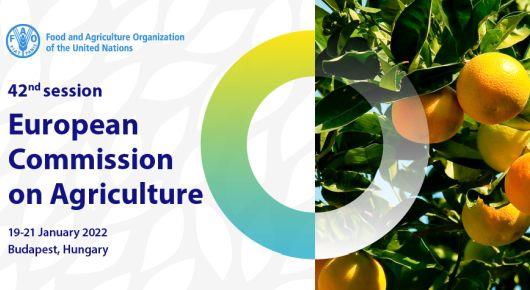Countries of Europe and Central Asia look at various aspects of food systems’ transformation

Reflecting nutritional challenges in Europe and Central Asia, the Forty-Second Session of the European Commission of Agriculture (ECA) is dedicated to transforming food systems to address all forms of malnutrition in the region. Starting tomorrow in a hybrid format, the event also relates to the global FAO theme for 2020–2021 – promoting healthy diets and preventing all forms of malnutrition – and to the International Year of Fruits and Vegetables, which concludes in February 2022.
To this end, the session aims to identify actions that help provide healthy and nutritious diets for all and will be expected to agree on policy recommendations for Members and FAO to address all forms of malnutrition in the region.
AGENDA ITEM – Transforming food systems for improved nutrition
At a time when the world is facing unprecedented challenges, policymakers and partners across the Europe and Central Asia region are increasingly focusing their attention on agrifood system transformation, recognizing that agriculture, health, nature, people, and food are intertwined and interconnected. Discussions will concentrate on how to adopt a holistic food systems approach to provide affordable and accessible healthy diets for all and address all forms of malnutrition.
AGENDA ITEM – Better production to increase access to diverse, nutritious foods
Overall, Europe and Central Asia is making progress to reduce malnutrition. However, according to recent FAO data, the region is not on track regarding childhood overweight, adult obesity, micronutrient deficiencies (mainly iron), and exclusive breastfeeding during the first six months after birth. Further shifts in mindset and bold policies and actions are needed to address food insecurity and nutrition issues and prevent obesity and overweight.
AGENDA ITEM – Territorial approaches and community development for local change
Many countries in the Europe and Central Asia region recognize the central role of territorial development in addressing the multidimensional issues of food systems and are keen to develop their own territorial or local development strategies. Nevertheless, the implementation of those strategies remains a challenge, mostly due to weak policymaking capacities at local levels. Yet, territorial approaches provide instruments for achieving more inclusive economic, social, and environmental development at the local level while facilitating linkages across national, regional, and global levels of action.
AGENDA ITEM – Advancing gender equality in the region: update on the progress made
Since 2010, the progress made in mainstreaming gender and social inclusion in FAO's work in the region is a permanent standing item on the Commission’s agenda. During the current session, FAO will report on the status of implementation of the Regional Gender Equality Strategy and Action Plan for 2019–2022, and highlight persistent gender gaps that limit progress among Member Countries towards achieving the Sustainable Development Goals (SDGs) and that require further attention and action.
